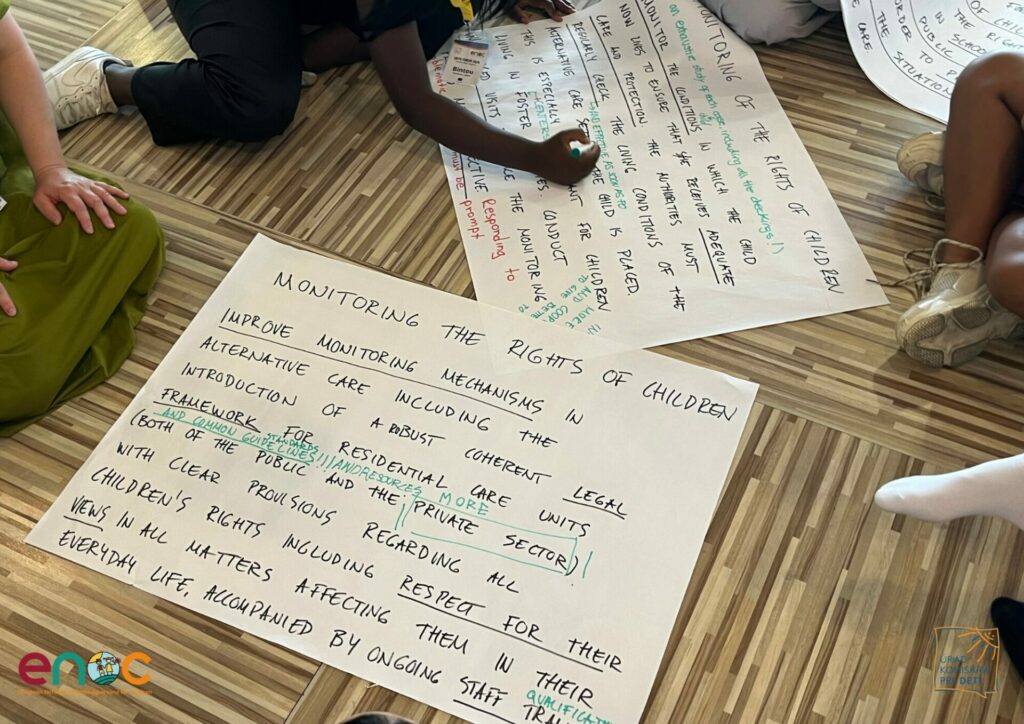The Rights of Children in Alternative Care
2024 Annual Theme
-
ENOC Synthesis Report on "The Protection and the Promotion of the Rights of Children in Alternative Care"
-
ENOC Position Statement on "Protecting and Promoting the Rights of Children in Alternative Care"
-
ENYA Report and Recommendations on "Let's Talk Young, Let's Talk about the Protection and Promotion of the Rights of Children in Alternative Care!"
“Every child and young person should live in a supportive, protective, and caring environment that promotes their full potential.”
— Guidelines for the Alternative Care of Children, General Assembly, United Nations, 2010.
According to the Council of Europe Committee for the Rights of the Child (CDENF), an estimated 1.5 million children and young people live in alternative care, including placements with relatives, foster care, and residential institutions.
Although countries are committed to protecting children's rights through the United Nations Convention on the Rights of the Child (UNCRC), children in alternative care are still among the most vulnerable. Fully respecting and protecting their rights remains a significant challenge.
ENOC countries/regions have consistently prioritized children's rights through policies and legislation that emphasize the best interests of the child as paramount in all decisions. Key articles of the UNCRC, including the right to be heard (Article 12), the right to life, survival, and development (Article 6), and the principle of non-discrimination (Article 2), provide a strong framework for safeguarding children in alternative care. Additionally, the right to special protection for children unable to live with their families (Article 20) ensures that alternative care respects their cultural, religious, and linguistic backgrounds.
Despite a strong international framework, the rights of children in alternative care are still significantly undermined. One major issue is ensuring their voices are heard in decisions that impact their lives. Too often, these children are excluded from the decision-making process, leaving their views marginalized. The UN General Comment No. 14 (2013) emphasizes the importance of considering the child's best interests as a primary concern.
Children in alternative care also face risks of rights violations such as poor living conditions, limited access to education and healthcare, and discrimination. The quality of care across Europe varies significantly, with disparities in caregiver training, oversight of care facilities, and support services for aftercare.
ENOC Member States must continue to strengthen child protection systems, and, most importantly, ensure that children's voices are not just heard but actively considered in shaping their future. This commitment is reflected in ENOC's 2024 annual theme, which focuses on the protection and promotion of the rights of children in alternative care.
A special Working Group, chaired by the Ombudsman for Children in Finland, led the work on this year’s annual theme. The research part was supported by experts Tarja Pösö, Professor Emerita, University of Tampere (Finland), and Terhi Tuukkanen, Senior Researcher at the Office of the Ombudsman for Children, Finland.
The research included an overview of the alternative care systems based on the feedback provided by 34 surveyed ENOC member institutions. The research findings highlighted a range of shortcomings in implementing children’s rights and the quality of alternative care, as well as a diversity of practices aligned with existing guidelines. The study also revealed a widespread existence of legislation and other guidance intended to promote good practices in alternative care.
During the ENOC Spring Seminar, held in June 2024 in Tallinn, Estonia, a preliminary presentation of the research findings was delivered, followed by a round of discussions on ENOC’s position statement on the annual theme. Alongside the ENOC research, the ENYA (European Network of Young Advisors) child participation project 2024 involved children from 15 member countries/regions, including the majority with care experience, who elaborated recommendations based on their life experience and aimed to improve the care system and the respect of their rights.
The final event of the annual policy focus area, the ENOC 28th Annual Conference, titled "The Protection and Promotion of the Rights of Children in Alternative Care," took place on 18–19 September 2024 in Helsinki, Finland. It brought together Ombudspersons and Commissioners for Children from across Europe, 13 Young Advisors from ENYA, representatives from key European and international governmental and non-governmental organizations, governmental authorities from Finland, and experts and stakeholders working in the children’s rights field.
The primary outcome - the 2024 Policy Position Statement on "Protecting and Promoting the Rights of Children in Alternative Care" informed by the research and the ENYA recommendations - was approved by the 28th ENOC General Assembly on 20th September 2024 in Helsinki.



